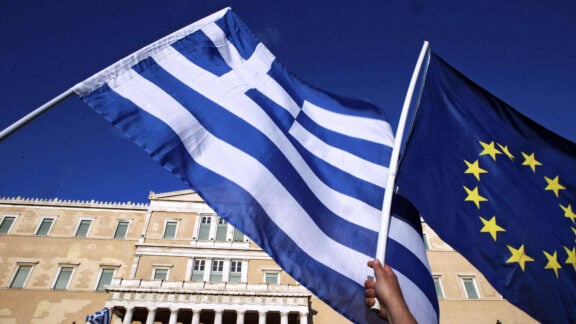Last week Greece reached a landmark deal with the troika to restructure its debt bailout program, offering a new glimmer of light – not just to Greece but the global economy.
A series of compromises were thrashed out in Brussels, unlocking the long-delayed 43.7 billion euros ($A54.2 billion) on the bail out program – effectively granting Greece debt relief for decades to come. The agreement wasn’t lost on global markets and in Australia – increasing share prices and keeping the Australian dollar high against the Greenback.
The measures announced include reducing interest rates on Greece’s bailout loans to very low levels – so low, that eurozone countries may incur losses on them – that will allow Athens space to reduce its debt below projections. On the back of the agreement, and positive movement in China on growth this week, Canberra economist Stephen Koukoulas – former economic advisor to Prime Minister Julia Gillard – told Neos Kosmos that the Aussie dollar could, subject to the RBA’s decision on interest rates next week, continue to rise to $US1.08 over the next few months.
“Certainly we’ve had commodity prices no longer falling, particularly iron ore and others have actually moved well above the lows that we saw in October,” he said. “Over the last month we’ve had some good news out of China, and the fact that the Chinese economy is picking up a little is good news for Australia.” Koukoulas believes last week’s deal announced between Greece and the troika is cause for optimism.
“We’ve seen plenty of false dawns over the last couple of years with Greece’s debt crisis, but this one looks to be more substantive than others. “One reason is that the Greek Parliament has now passed the range of austerity measures the troika required; they’re in place, and the trajectory of Greek debt peaking and then starting to decline is a reasonable one. “The other factor is that the IMF and Christine Lagarde did offer some softening – for example the Greek bonds that the ECB holds – the profits on these bonds are to be repatriated to Greece.
“There’s also a highly concessional interest rate that Greece now has to pay on its borrowing, and that will help get the Greek economy back on an even keel.” Greece’s economy has shrunk by nearly 25 per cent in the past five years. Questions remain as to whether Greek debt can become sustainable without eurozone governments having to write off loans made to Athens. In a week that Koukoulas says international markets breathed a sigh of relief over Greece, the MD of Market Economics says its about taking one step at a time.
“Greece can’t cut it’s government debt from 190 per cent to 100 per cent tomorrow. It has to be a strategy with many different components to it. And those components will change. As we stand, you can only fight the current battle.” To what degree is Australia effected by the ebb and flow of the Greek debt crisis? “At the moment this deal pushes Greece to the sidelines for the next few months. We’re going to see the markets look at other economies. “The problems run deep, and we have to look now at the eurozone issues through what’s happening in Spain and Portugal and Italy. France is on a negative credit watch. There’s still a significant risk of a bit of a debacle and a nasty market shock.
“When there’s little news at home, our economy is driven by global markets, it’s a sentiment thing. People call it ‘risk on’ or ‘risk off’, and a rising tide lifts every boat.” Koukoulas says that while further chapters of the Greek debt saga will play out in the years ahead, speculation over Greece’s imminent departure from the euro is at an end; at least for now. “That discussion is over, says the former Commonwealth Treasury advisor. “The new bail out conditions and the fact that the IMF and Christine Lagarde in particular were willing to compromise is likely to mean there’s good news ahead.”
Stephen Koukoulas is Managing Director of Market Economics Pty Ltd which he established in Canberra to provide independent macroeconomic analysis to businesses. Stephen is a former Senior Economic Advisor to the Prime Minister, having moved there from a senior role in the Commonwealth Treasury. Before that he spent three years in London as the Global Head of research and strategy for TD Securities.







